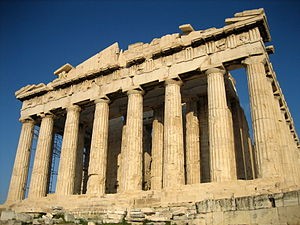[contextly_auto_sidebar]
The second of my histories of the creative class just went up on the website for Radio Silence, the Bay Area journal dedicated to music and literature. Here’s a passage from it:
Greece saw a kind of civic society of music and dance. Every class from king to serf took part; the children of citizens were educated to sing and play the lyre; and guests at a drinking party were expected to bring a song of their own to lead in the same way that people today typically show up at gatherings with bottles of wine. Athens also had a respected, if small, professional creative class: Players of the aulos performed at various religious festivals and large sporting events, developed virtuosity and individual styles, and competed with each other for prizes. Sophocles described death as a land without music, “lyreless, chorusless.”
By the time the Golden Age dawned, Athens and other Ionian towns and cities had gone through a revolution that may be the most profound change in the history of art: the beginning of art for art’s sake. Art was no longer utilitarian—no longer called the bison, calmed the gods, cured your cold—but became an end in itself. “As soon as man feels secure and free from the immediate pressure of the struggle for life,” Hauser wrote, “he begins to play with the spiritual resources which he had originally developed as weapons and tools to aid him in his necessity. He begins enquiring into causes, seeking for explanations, researching into connections which have little or nothing to do with his struggle for life. Practical knowledge gives place to free enquiry, means for the mastery of nature become methods for discovering abstract truth.” He could have been describing postwar Greenwich Village here.
The piece is here. I’ve got one more coming on the Radio Silence site, in November.
